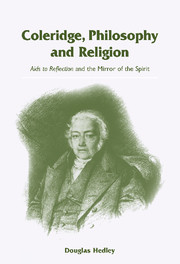Book contents
- Frontmatter
- Contents
- Acknowledgements
- List of abbreviations
- Notes on the text
- Prologue: explaining Coleridge's explanation
- 1 The true philosopher is the lover of God
- 2 Inner word: reflection as meditation
- 3 The image of God: reflection as imitating the divine spirit
- 4 God is truth: the faculty of reflection or human Understanding in relation to the divine Reason
- 5 The great instauration: reflection as the renewal of the soul
- 6 The vision of God: reflection culture, and the seed of a deiform nature
- Epilogue: the candle of the Lord and Coleridge's legacy
- Bibliography
- Index
1 - The true philosopher is the lover of God
Published online by Cambridge University Press: 15 December 2009
- Frontmatter
- Contents
- Acknowledgements
- List of abbreviations
- Notes on the text
- Prologue: explaining Coleridge's explanation
- 1 The true philosopher is the lover of God
- 2 Inner word: reflection as meditation
- 3 The image of God: reflection as imitating the divine spirit
- 4 God is truth: the faculty of reflection or human Understanding in relation to the divine Reason
- 5 The great instauration: reflection as the renewal of the soul
- 6 The vision of God: reflection culture, and the seed of a deiform nature
- Epilogue: the candle of the Lord and Coleridge's legacy
- Bibliography
- Index
Summary
God said to Moses, ‘i am who i am’ (Exodus 3: 14)
The Trinity means the divine mystery: the content is mystical, i.e. speculative.
(Hegel)It is the doctrine of the tri-unity that connects Xty with Philosophy …
(Coleridge, Notebooks iv. 4860)Coleridge repeatedly asserts that the essential ideas that interested him in Schelling were known to him through the English Platonic tradition. This claim has led scholars to scrutinise Coleridge's contact with Neoplatonic philosophy before his visit to Germany in 1798–99. Generally scholars have concluded that Coleridge is lying or they are forced to claim a depth of study and insight that is barely supported by the evidence of his notebooks and letters. Wellek argued that Coleridge has no sense of the incompatibility of his seventeenth-century English sources and German Idealism:
a storey from Kant, there a part of a room from Schelling, there a roof from Anglican theology and so on. The architect did not feel the clash of styles, the subtle and irreconcilable differences between the Kantian first floor and the Anglican roof. Coleridge's ‘untenable architectonic’, and his inability ‘to construct a philosophy of his own … drove him into a fatal dualism of a philosophy of faith, which amounted to an intellectual justification of this bankruptcy of thought.
Norman Fruman attacks the claim that Coleridge felt a genial affinity with Schelling by remarking that the ‘specific influence from antiquity or the Neoplatonists consists of scraps and tatters’. Our counter thesis is that Wellek and Frumann are mistaken. Coleridge's claim is ingenuous and his achievement ingenious. The post-Kantians revived the doctrine of the Trinity in a philosophical manner.
- Type
- Chapter
- Information
- Coleridge, Philosophy and ReligionAids to Reflection and the Mirror of the Spirit, pp. 18 - 87Publisher: Cambridge University PressPrint publication year: 2000



